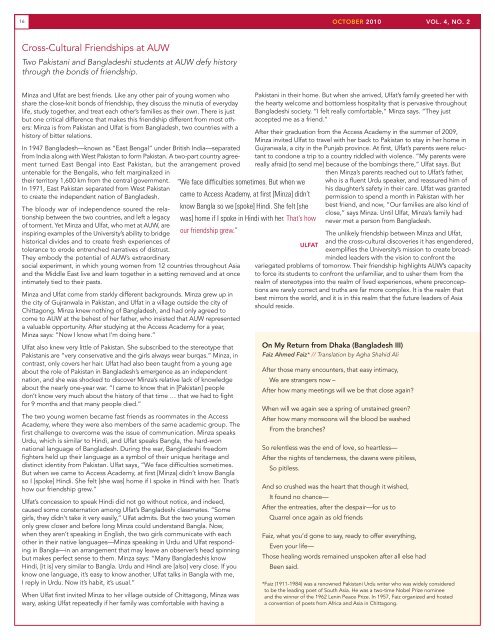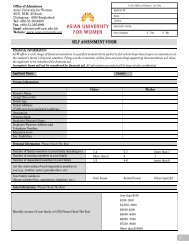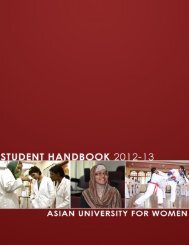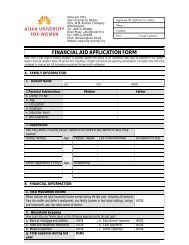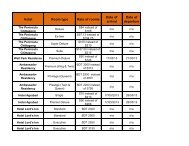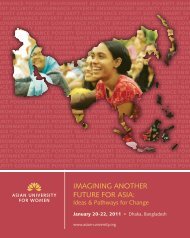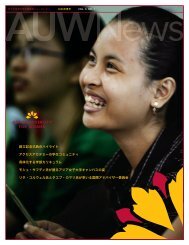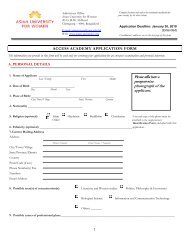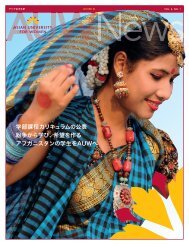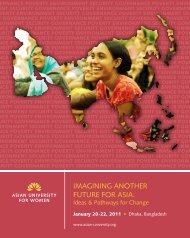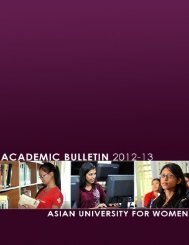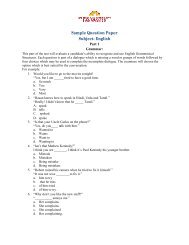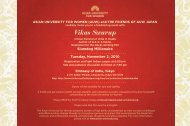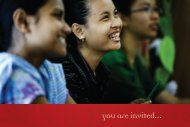Fall 2010 - Asian University for Women
Fall 2010 - Asian University for Women
Fall 2010 - Asian University for Women
You also want an ePaper? Increase the reach of your titles
YUMPU automatically turns print PDFs into web optimized ePapers that Google loves.
16<br />
OCTOBER <strong>2010</strong> VOL. 4, NO. 2<br />
Cross-Cultural Friendships at AUW<br />
Two Pakistani and Bangladeshi students at AUW defy history<br />
through the bonds of friendship.<br />
Minza and Ulfat are best friends. Like any other pair of young women who<br />
share the close-knit bonds of friendship, they discuss the minutia of everyday<br />
life, study together, and treat each other’s families as their own. There is just<br />
but one critical difference that makes this friendship different from most others:<br />
Minza is from Pakistan and Ulfat is from Bangladesh, two countries with a<br />
history of bitter relations.<br />
In 1947 Bangladesh—known as “East Bengal” under British India—separated<br />
from India along with West Pakistan to <strong>for</strong>m Pakistan. A two-part country agreement<br />
turned East Bengal into East Pakistan, but the arrangement proved<br />
untenable <strong>for</strong> the Bengalis, who felt marginalized in<br />
their territory 1,600 km from the central government.<br />
In 1971, East Pakistan separated from West Pakistan<br />
to create the independent nation of Bangladesh.<br />
The bloody war of independence soured the relationship<br />
between the two countries, and left a legacy<br />
of torment. Yet Minza and Ulfat, who met at AUW, are<br />
inspiring examples of the <strong>University</strong>’s ability to bridge our friendship grew.”<br />
historical divides and to create fresh experiences of<br />
tolerance to erode entrenched narratives of distrust.<br />
They embody the potential of AUW’s extraordinary<br />
social experiment, in which young women from 12 countries throughout Asia<br />
and the Middle East live and learn together in a setting removed and at once<br />
intimately tied to their pasts.<br />
Minza and Ulfat come from starkly different backgrounds. Minza grew up in<br />
the city of Gujranwala in Pakistan, and Ulfat in a village outside the city of<br />
Chittagong. Minza knew nothing of Bangladesh, and had only agreed to<br />
come to AUW at the behest of her father, who insisted that AUW represented<br />
a valuable opportunity. After studying at the Access Academy <strong>for</strong> a year,<br />
Minza says: “Now I know what I’m doing here.”<br />
Ulfat also knew very little of Pakistan. She subscribed to the stereotype that<br />
Pakistanis are “very conservative and the girls always wear burqas.” Minza, in<br />
contrast, only covers her hair. Ulfat had also been taught from a young age<br />
about the role of Pakistan in Bangladesh’s emergence as an independent<br />
nation, and she was shocked to discover Minza’s relative lack of knowledge<br />
about the nearly one-year war. “I came to know that in [Pakistan] people<br />
don’t know very much about the history of that time … that we had to fight<br />
<strong>for</strong> 9 months and that many people died.”<br />
The two young women became fast friends as roommates in the Access<br />
Academy, where they were also members of the same academic group. The<br />
first challenge to overcome was the issue of communication. Minza speaks<br />
Urdu, which is similar to Hindi, and Ulfat speaks Bangla, the hard-won<br />
national language of Bangladesh. During the war, Bangladeshi freedom<br />
fighters held up their language as a symbol of their unique heritage and<br />
distinct identity from Pakistan. Ulfat says, “We face difficulties sometimes.<br />
But when we came to Access Academy, at first [Minza] didn’t know Bangla<br />
so I [spoke] Hindi. She felt [she was] home if I spoke in Hindi with her. That’s<br />
how our friendship grew.”<br />
Ulfat’s concession to speak Hindi did not go without notice, and indeed,<br />
caused some consternation among Ulfat’s Bangladeshi classmates. “Some<br />
girls, they didn’t take it very easily,” Ulfat admits. But the two young women<br />
only grew closer and be<strong>for</strong>e long Minza could understand Bangla. Now,<br />
when they aren’t speaking in English, the two girls communicate with each<br />
other in their native languages—Minza speaking in Urdu and Ulfat responding<br />
in Bangla—in an arrangement that may leave an observer’s head spinning<br />
but makes perfect sense to them. Minza says: “Many Bangladeshis know<br />
Hindi, [it is] very similar to Bangla. Urdu and Hindi are [also] very close. If you<br />
know one language, it’s easy to know another. Ulfat talks in Bangla with me,<br />
I reply in Urdu. Now it’s habit, it’s usual.”<br />
When Ulfat first invited Minza to her village outside of Chittagong, Minza was<br />
wary, asking Ulfat repeatedly if her family was com<strong>for</strong>table with having a<br />
“We face difficulties sometimes. But when we<br />
came to Access Academy, at first [Minza] didn’t<br />
know Bangla so we [spoke] Hindi. She felt [she<br />
was] home if I spoke in Hindi with her. That’s how<br />
Pakistani in their home. But when she arrived, Ulfat’s family greeted her with<br />
the hearty welcome and bottomless hospitality that is pervasive throughout<br />
Bangladeshi society. “I felt really com<strong>for</strong>table,” Minza says. “They just<br />
accepted me as a friend.”<br />
After their graduation from the Access Academy in the summer of 2009,<br />
Minza invited Ulfat to travel with her back to Pakistan to stay in her home in<br />
Gujranwala, a city in the Punjab province. At first, Ulfat’s parents were reluctant<br />
to condone a trip to a country riddled with violence. “My parents were<br />
really afraid [to send me] because of the bombings there,” Ulfat says. But<br />
then Minza’s parents reached out to Ulfat’s father,<br />
who is a fluent Urdu speaker, and reassured him of<br />
his daughter’s safety in their care. Ulfat was granted<br />
permission to spend a month in Pakistan with her<br />
best friend, and now, “Our families are also kind of<br />
close,” says Minza. Until Ulfat, Minza’s family had<br />
never met a person from Bangladesh.<br />
The unlikely friendship between Minza and Ulfat,<br />
and the cross-cultural discoveries it has engendered,<br />
ULFAT<br />
exemplifies the <strong>University</strong>’s mission to create broadminded<br />
leaders with the vision to confront the<br />
variegated problems of tomorrow. Their friendship highlights AUW’s capacity<br />
to <strong>for</strong>ce its students to confront the unfamiliar, and to usher them from the<br />
realm of stereotypes into the realm of lived experiences, where preconceptions<br />
are rarely correct and truths are far more complex. It is the realm that<br />
best mirrors the world, and it is in this realm that the future leaders of Asia<br />
should reside.<br />
On My Return from Dhaka (Bangladesh III)<br />
Faiz Ahmed Faiz* // Translation by Agha Shahid Ali<br />
After those many encounters, that easy intimacy,<br />
We are strangers now –<br />
After how many meetings will we be that close again?<br />
When will we again see a spring of unstained green?<br />
After how many monsoons will the blood be washed<br />
From the branches?<br />
So relentless was the end of love, so heartless—<br />
After the nights of tenderness, the dawns were pitiless,<br />
So pitiless.<br />
And so crushed was the heart that though it wished,<br />
It found no chance—<br />
After the entreaties, after the despair—<strong>for</strong> us to<br />
Quarrel once again as old friends<br />
Faiz, what you’d gone to say, ready to offer everything,<br />
Even your life—<br />
Those healing words remained unspoken after all else had<br />
Been said.<br />
*Faiz (1911-1984) was a renowned Pakistani Urdu writer who was widely considered<br />
to be the leading poet of South Asia. He was a two-time Nobel Prize nominee<br />
and the winner of the 1962 Lenin Peace Prize. In 1957, Faiz organized and hosted<br />
a convention of poets from Africa and Asia in Chittagong.


